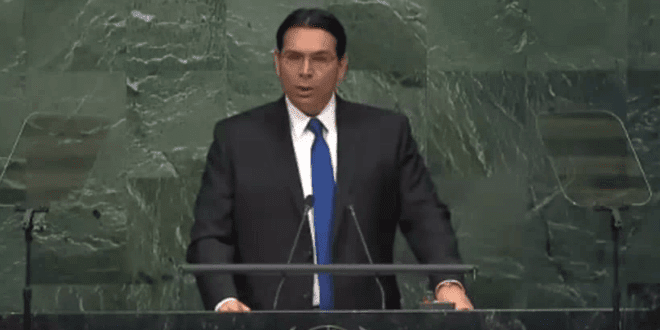Hours before the onset of Yom Kippur, the holiest day in the Jewish calendar, Israeli Ambassador to the United Nations Danny Danon transformed a contentious General Assembly session into a moment of prayer, invoking an ancient Jewish commandment as he pleaded for the return of hostages held in Gaza.
The extraordinary scene unfolded on Wednesday during a meeting convened to discuss Washington’s recent veto of a Security Council resolution demanding an Israel-Hamas ceasefire. Frustrated by what he characterized as the UN’s “empty gestures,” Danon donned a kippa and delivered a traditional Jewish prayer before the assembled diplomats.
“Speech does not free hostages, and words do not stop terror,” Danon declared, before shifting from political discourse to spiritual supplication. “While you perform, I will pray.”
Speaking first in Hebrew, then English, the ambassador recited: “Master of the universe, the One who saves and delivers, may He redeem, in His great mercy, our captives, from the hands of cruel and harsh enemies. May He swiftly return them to their land, to embrace sons and daughters, women and children, to serve You with awe and reverence, with joy and with a full heart and may Your great name be sanctified through them, in the eyes of all who live.”
On the eve of Yom Kippur, while most UN ambassadors were discussing declarations and resolutions that reward Hamas, I used my time at the General Assembly to offer a prayer for the release of the hostages.
— Danny Danon 🇮🇱 דני דנון (@dannydanon) October 1, 2025
“Master of the Universe, the One who saves and delivers,
May He redeem,… pic.twitter.com/rF3esy9tl0
The prayer’s language directly echoes Pidyon Shvuyim, a Jewish commandment that involves redeeming captives, considered one of the most sacred obligations in Jewish law. This mitzvah, which literally means “redemption of captives,” is so paramount that the medieval scholar Maimonides wrote that “there is no mitzvah greater than Pidyon Shvuyim.” The Talmud teaches that redeeming captives takes precedence over feeding and clothing the poor, and Jewish communities throughout history have bankrupted themselves to fulfill this commandment.
The principle behind Pidyon Shvuyim recognizes that captivity threatens not only physical survival but also spiritual well-being, and that every moment in captivity represents unbearable suffering. Jewish law mandates that communities must act swiftly and decisively to secure the release of captives, making it a collective responsibility that transcends individual capability.
Danon’s prayer came amid sharp criticism of the UN body, which he accused of being “detached from reality” for recycling “failed resolutions that do nothing for peace.” He contrasted what he described as the General Assembly’s “great shows of theater, long speeches, grand declarations” and “staged walkouts”—a reference to the organized protest during Israeli Prime Minister Benjamin Netanyahu’s address last week—with U.S. President Donald Trump’s “plan of action to resolve the war.”
The ambassador specifically criticized the September 18 Security Council resolution vetoed by Washington, noting it failed to condemn Hamas or recognize Israel’s right to defend itself. He commended the United States for acting with “moral clarity.”
“The fact that we meet here today to recycle failed resolutions that do nothing for peace proves one truth,” Danon told the assembly. “This body is detached from reality.”
Danon vowed that Israel would bring the hostages home “the easy way or the hard way, but they will return home”—a statement reflecting both diplomatic and potential military options for securing their release.
U.S. Ambassador to the United Nations Mike Waltz reinforced Danon’s message, placing responsibility for the continuing conflict squarely on Hamas.
“The reality is that Hamas is responsible for starting and continuing this war,” Waltz stated. “Israel has repeatedly accepted proposed terms that would end the war.”
Waltz challenged the assembly: “My question to you all: Where is the outcry? Where are the demands for Hamas to accept this offer of peace? Where are the demands for Hamas to end the suffering? They could end it today by accepting this offer, and by doing that, we all, together, can ensure that this never ever happens again.”
The timing of Danon’s prayer—on the eve of Yom Kippur, the Day of Atonement when Jews traditionally seek forgiveness and pray for inscription in the Book of Life—underscored the spiritual and emotional weight of the hostage crisis for the Jewish state and its people.




